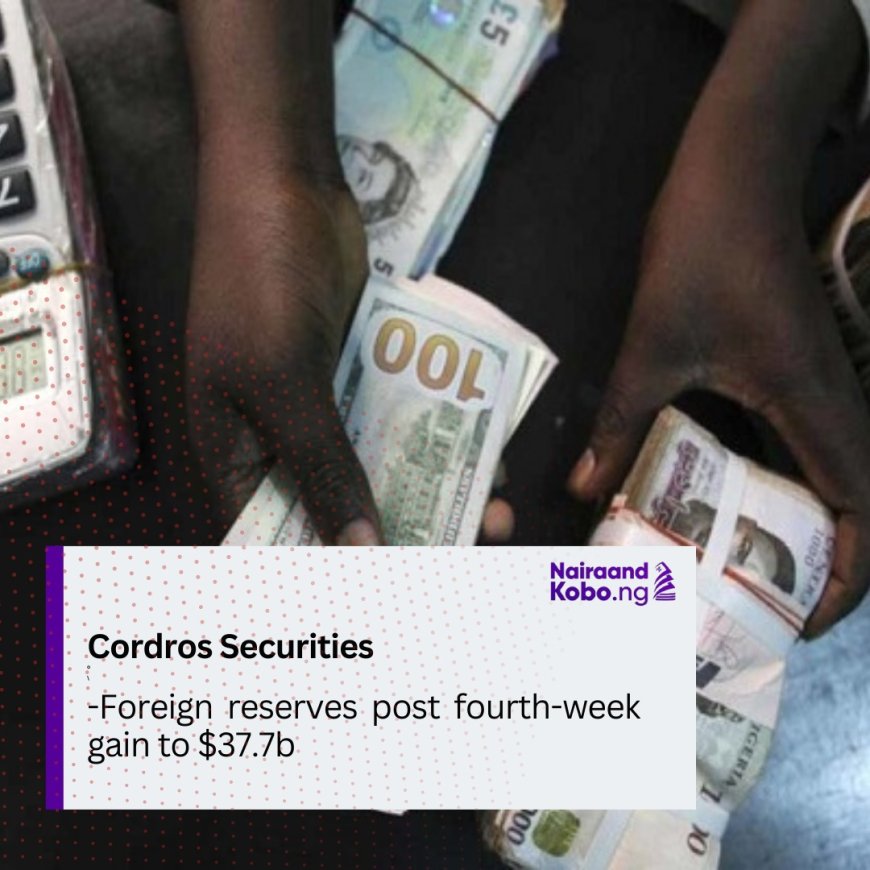Foreign reserves post fourth-week gain to $37.7b

The foreign reserves increased for the fourth consecutive time last week by $310.75 million week-on-week (w/w) to $37.78 billion.
The uptick in foreign reserves at a period of crude oil prices decline speaks to the gradual surge in foreign capital inflows and pick up in investors’ confidence in the economy.
The foreign reserves accretion equally had a positive effect on the naira exchange rates at both official and parallel markets.
Market insights from at Cordros Securities explained that the Central Bank of Nigeria (CBN’s) consistent effort to support the naira including $89 million intervention through the Bureaux De Change (BDCs) last week caused the naira to settle at N1,540.78/$ (+5bps w/w) at the Nigerian Autonomous Foreign Exchange Market (NAFEM)- official market.
Total turnover at the NAFEM as of 26 September increased by 3.7 per cent with trades consummated within the N1,540.00/$ to N1,699/$ band.In the forwards market, the naira rates decreased across the 1-month (-2.7 per cent to N1,684.53/$), 3-month (-2.6 per cent to N1,721.12/$), 6-month (-2.0 per cent to N1,849.07/$) and 1-year (-1.5 per cent to N2,051.10/$) contract.
At the parallel market, naira recorded its first gain to close at N1,690/$ after the Monetary Policy Committee (MPC) decision to hike the interest rate by 50 basis points and liquidity injection through the BDCs.
The local currency appreciated by 0.59 per cent from N1,705 it closed last Wednesday, a day after the MPC rate hike. The BDCs which had been starved of forex were supplied $20,000 each on Thursday.
Head of Research at Commercio Partners, Ifeanyi Uba, said oil prices experienced a sharp decline, with Brent and West Texas Intermediate crude falling over two per cent due to easing supply concerns from Libya and weakening demand forecasts, despite China’s recent stimulus efforts.
“While falling U.S. crude inventories and tensions in the Middle East provided some support, reports of Saudi Arabia planning to unwind voluntary production cuts in December further pressured prices. This move by Saudi Arabia is seen as an attempt to regain market share, abandoning its $100 price target. Analysts remain concerned about weak demand, with Wall Street forecasts lowering expectations for crude prices in the coming months,” he said.
Managing Director, Financial Derivatives Company Limited, Bismarck Rewane, advised the CBN to sustain dollar interventions to keep the naira gaining against global currencies.
In a bid to enhance liquidity and reduce distortions in the foreign exchange (FX) market, the CBN introduced a market unification framework that streamlines the FX market. This initiative has simplified transactions and reduced the fragmentation that previously hampered market operations.
Additionally, the CBN made significant progress by clearing a $7 billion backlog of valid FX forwards, a move that stabilized the exchange rate and bolstered market confidence.
Analysts said the improvement in foreign reserves position has contributed to reduced FX volatility and reinforced confidence in Nigeria’s exchange rate management.
Foreign reserves have over the years, been impacted by crude oil production and prices.
In September 2008, the country’s foreign exchange reserves hit $62 billion, with the Federal Government spending $12 billion from it to settle external debts.
The reserves stood at $40 billion in $40 billion in January 2014 and $40.4 billion in December 2017.
The reserves rose again to $45 billion in July 2019 before it started dropping to present position, with intermittent rise and fall within the band.
Foreign reserves post fourth-week gain to $37.7b - The Nation Newspaper (thenationonlineng.net)









